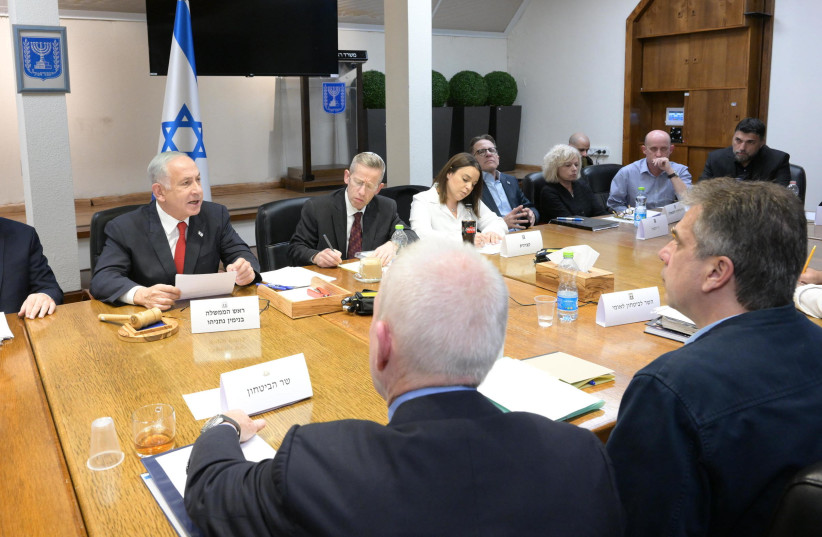A bitter dispute over who should participate in an IDF investigation into security failures contributing to the October 7 massacre broke out at the security cabinet as it was ending its debate about Israel’s plan for the “day after.”
Several ministers had harsh words for IDF Chief-of-Staff Herzl Halevi during the discussion, which Prime Minister Benjamin Netanyahu ended at midnight on Thursday.
Finance Minister Bezalel Smotrich (Religious Zionist Party) took issue with reports that the meeting ended prematurely due to the heated exchange, explaining that it had already been scheduled to end at that time.
“The meeting didn’t explode, the prime minister had said it would end – from the start – at midnight,” Smotrich stated.
The reports of the explosive conversation and the contents of that debate were leaked to the media, given that the contents of such meetings are secret and not made public, short of through official announcements. “It’s a terrible thing” to leak such information, Smotrich said.

"Proof the government needs to be replaced"
Opposition leader Yair Lapid, a former prime minister and former foreign minister, said that the leaks were proof that this government needed to be replaced, even while the war was ongoing.
“The leaks from the cabinet [Thursday] night are a disgrace and further proof that this cabinet is dangerous. The State of Israel must replace the government and its leader. These people are not worthy of the sacrifice and heroism of IDF men and women and will not be able to make strategic decisions. They have to go now.”
Labor Party leader Merav Michaeli issued a similar statement.
“Every minute that these people make decisions about our lives endangers life and limb. Standing with the chief of staff and senior IDF officers who have to battle a hostile government that is fighting them instead of Hamas, once again it is clear how dangerous Netanyahu is for Israel and how urgent it is to replace him immediately,” she said.
“This time, you won’t be able to escape,” Michaeli added.
At issue was opposition to an IDF plan for an internal investigatory committee that would include former defense minister and former IDF chief-of-staff Shaul Mofaz, IDF intelligence chief Maj.-Gen. Aharon Zeevi Farkash, and former IDF southern command chief Sami Turgeman.
The committee would be tasked with investigating the military failures that contributed to the Hamas-led October 7 attack, in which over 1.200 people were killed and another 250 were taken hostage.
The results of the committee were intended for internal use, to immediately improve flaws in IDF operations moving forward, and were not expected to constitute a formal investigatory committee.
Some of the ministers in the meeting were upset that Mofaz and Farkash were part of the team. Both men had held top military roles during the 2005 disengagement from Gaza and in the lead-up to the Second Lebanon War.
Among those who spoke out were National Public Security Minister Itamar Ben-Gvir (Otzma Yehudit) and Transportation Minister Miri Regev (Likud).
After the meeting, Ben-Gvir stated, that “appointing Mofaz” was “adding insult to injury.” He said Mofaz was “one of the main architects of the [damaging] disengagement, who is a political figure, and above all, was an essential partner in the [strategic] construction that brought us to this point.”
He added, “Given that any investigation must also include examining decisions around disengagement, its architect can’t be part of the investigatory process.”
Ben-Gvir also took issue with Farkash’s support of those who, during the fierce debate over the judicial reform, said they would refuse to serve in the IDF as a protest move.
Those actions were also “undoubtedly a catalyst for the events of October 7,” Ben-Gvir stated. “These are people whose actions should be investigated rather than being investigators,” he charged.
At one point during the stormy back and forth at the end of the meeting, Minister Benny Gantz defended Halevi and expressed his frustration with Ben-Gvir’s insisting that the strategic concept of disengagement was relevant to this particular issue.
According to Walla, Gantz retorted, “This is a professional investigation, what does it have to do with the disengagement and the [strategic] conception? The chief of staff is f***ing conducting an investigation into what happened now, to serve the goals of the war and our ability to prepare for a conflict in the north.”
The debate overshadowed the main issue of the meeting, which had until that moment been a debate on plans for what would happen in Gaza on the “day after.”
Israel is expected to discuss such plans with United States Secretary of State Antony Blinken when he arrives in Israel this week.
